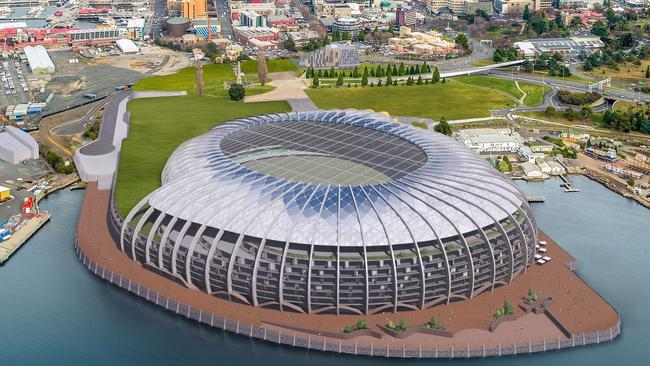Macquarie Point Stadium 2.0 could benefit many suitors says project chief
The man overseeing the proposed Macquarie Point Stadium 2.0 development says the benefits go well beyond just an AFL and AFLW club.

Sport
Don't miss out on the headlines from Sport. Followed categories will be added to My News.
The proposed Macquarie Point Stadium 2.0 development will not only be the home of Tasmania’s AFL and AFLW teams, world-class sport, concerts and entertainment, it would also be a financial boost for the City of Hobart.
Proponents of the $2.3b Macquarie Point redevelopment say the site would transform from a drain on Hobart City Council coffers to a new source of income through rates earnings levied on the private apartments, private hospital, hotel, convention centre and hospitality and retails spaces, and stadium.
After agreeing in principle this week to grant council-owned land at Macquarie Point on the regatta grounds to Stadia Precinct Consortia for the multipurpose development, project chief Dean Coleman said it would ultimately be a smart investment for the state’s most powerful council.
But not before certain conditions are met.
“They are making sure the deal for the council and the rate payers of Hobart is an exceptionally good one” Coleman said.
“What we actually will do is take an asset that doesn’t provide any income but has a lot of outgoings on it and make it an asset that provides significant income from the rates from the accommodation and the various businesses, hotels and stadium being based on the site.”
In a statement, Lord Mayor Anna Reynolds said: “The Council decision recognises that it is a condition of the state government’s consideration of the Stadia 2.0 proposal that, among other things, it receives the in-principle support of the Hobart City Council.
“Council’s decision is to provide in-principle support and landlord consent for Stadia Precinct Consortium Pty Ltd to progress their proposal through a formal planning assessment phase.”
HCC wants a report “containing qualified advice about the proposal” and that support for Mac2 was “not at the exclusion of any alternative proposals for Regatta Point”.
“Under the review that’s done as part of their due diligence for any land that is transferred to anybody else, it has got to have a correct financial return for the council and delivers a return for ratepayers, and we have been working with them on that,” Coleman said.
Mac2’s transport strategy, which includes electric buses doing a loop of the CBD, will also boost the HCC’s plan to reduce traffic congestion in the city.
A park-and-ride project located at the regatta grounds was a key element of HCC’s 2010 Master Plan.
The council will also consult on the 5000-space underground carpark proposed for the stadium site, but will not operate it.
The next piece of the puzzle is for Stadia Precinct Consortia to deliver its response to the state government’s questions about the Mac2 stadium project, which includes a financial breakdown and environmental impact, due on Monday.



